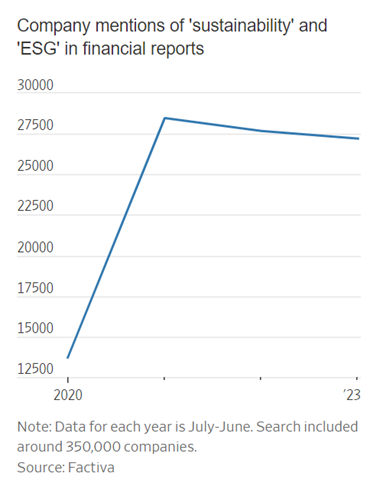In recent years, environmental, social, and governance (ESG) investing has gained significant traction with investors who are interested in considering factors beyond financial performance. However, this trend has also faced some backlash. Critics argue that ESG investing can hinder financial returns, question its underlying political motivations, and debate the appropriate extent of corporate involvement in broader societal issues. They are also concerned with the lack of standardized ESG metrics and reporting, which can lead to concerns about greenwashing and the credibility of ESG claims.
The backlash has led to increased regulatory scrutiny of ESG practices, with some governments introducing legislation to limit or restrict the use of ESG factors in investment decisions. During 2023, 165 different anti-ESG bills across 37 states were introduced. Of these, 14 states successfully passed the bills. In the 23 states where anti-ESG legislation did not pass, a total of 42 bills across 10 states will carry over into 2024. Among the 14 states that did enact anti-ESG measures, 22 bills and 6 resolutions were approved. Unfortunately, anti-ESG can result in financial consequences.
According to a study from the Wharton School at the University of Pennsylvania titled “Gas, Guns, and Governments: Financial Costs of Anti-ESG,” Texas cities paid an additional $300 million to $500 million in interest on $32 billion in bonds through April 2022 as a result of anti-ESG legislation. In addition, the Texas Association of Business Chambers of Commerce Foundation released an economic impact study that found anti-ESG laws passed in 2021 will result in $668.7 million lost in economic activity, $180.7 million in decreased annual earnings, 3,034 fewer full-time jobs, and $37.1 million in losses to Texas state and local tax revenue.
Backlash Against Anti-ESG Backlash
Despite the anti-ESG backlash, there have been several legal challenges brought against anti-ESG laws in the US. These challenges often argue that such laws:
- Violate the First Amendment: They claim these laws restrict free speech, particularly for those who advocate for environmental or social causes.
- Exceed state authority: Some challenges argue that states do not have the authority to regulate private companies’ investment decisions.
- Discriminate against certain industries or viewpoints: They argue these laws unfairly favor certain industries, such as fossil fuels, while discriminating against others.
The American Sustainable Business Council (ASBC), a nonprofit organization advocating for environmentally sustainable business practices, filed a lawsuit, aiming to block a state law that restricts Texas from investing in or contracting with businesses that support reducing reliance on fossil fuels. In another case, a pensioner in Oklahoma challenged the state’s Energy Discrimination Elimination Act (EDEA), which prohibits the state from doing business with financial institutions that boycott energy companies. An Oklahoma state court judge granted a temporary injunction blocking enforcement of the Oklahoma Energy Discrimination Act of 2022. While the state’s attorney general will continue to fight for the law, the Oklahoma Rural Association found earlier this year that the state has spent an additional $185 million and municipalities have incurred a 15.7% increase in borrowing costs since the EDEA was enacted.
Companies Continue Committed to Sustainability
Despite the anti-ESG backlash, companies remain committed to sustainability. This is likely being driven by an increased interest from investors and consumers in ESG criteria when making investing and purchasing decisions. For consumers, support for ESG is generally due to ethical concerns, personal values, long-term financial benefits, and increased transparency. Investors increasingly believe companies that perform well on ESG are less risky, better positioned for the long term, and better prepared for uncertainty. According to Factiva, the digital research platform owned by Dow Jones, nearly all (around 97%) mentions of ESG and sustainability topics are found within companies’ financial disclosures and earnings reports instead of earnings calls and marketing materials.

Notable Leading Companies in ESG
Adidas has made significant strides in sustainability by recycling plastic waste into high-quality sportswear and sneakers. The company partners with environmental groups to convert ocean and beach plastic into innovative products. In doing so, Adidas addresses plastic pollution while tackling sustainable fashion. In addition, Adidas reduced its greenhouse gas (GHG) emissions by 24% in 2023, demonstrating substantial progress toward environmental goals. The brand aims to eliminate virgin polyester from its products by 2024, focusing on recycled materials that maintain high quality and performance. Through these efforts, Adidas is positioning itself as a leader in sustainable practices within the sportswear industry.
Hewlett Packard Enterprise (HPE) has set ambitious climate targets including achieving Net Zero across its entire value chain by 2040, reducing Scope 1 and 2 emissions by 70% from 2020 to 2030, and cutting Scope 3 emissions by 42% between 2020 and 2030. HPE was a pioneer in its industry by establishing a verified 1.5-degree Science Based Net Zero Target. In 2022, the company accelerated its Net Zero commitment from 2050 to 2040. In order to reduce Scope 3 emissions, HPE is prioritizing low-impact suppliers, collaborating with suppliers who have science-based targets, and offering more sustainable options to customers. This strategy demonstrates HPE’s comprehensive approach to environmental responsibility throughout its supply chain and product lifecycle.
Why the “E” in ESG Matters
While companies are more reluctant to discuss ESG and sustainability in earnings calls and their marketing materials, they are feeling pressure to include ESG criteria in their financial reporting. Governments and regulatory bodies worldwide continue to prioritize sustainability, and in 2024, a number of ESG regulations are aimed at fostering transparency, accountability, and ethical business practices. These regulations, along with pressure from consumers and investors, are pressuring companies to emphasize the “E” in ESG criteria.
US Regulations
In the US, the Securities and Exchange Commission (SEC) announced new ESG disclosure requirements for companies. Under these new rules currently paused, public companies must improve and standardize climate-related disclosures. Additional climate risk disclosures, such as the impact of severe weather events and the governance of risk management processes, are required as well.
California has also enacted several climate disclosure bills, requiring companies to disclose their GHG emissions and climate-related financial risks. The regulations require large public and private companies operating in California to disclose their GHG emissions across their entire value chain, including Scope 1, Scope 2, and Scope 3 emissions. In addition, California mandates that public and private companies disclose the climate-related financial risks they face, in accordance with the recommendations of the Task Force on Climate-related Financial Disclosures (TCFD).
EU Regulations
In the European Union (EU), the Corporate Sustainability Reporting Directive (CSRD) mandates sustainability reporting for large companies and public-interest entities operating in the EU. The regulation requires companies to disclose information on their ESG performance, including environmental impact, social responsibility, and governance practices.
Conclusion
ESG has been politicized by ideological differences, corporate interests, uncertainty, geopolitical factors, and misinformation. While companies have pulled their focus back from the “S” and “G” in ESG temporarily, it is important they continue to focus on the “E” in order to not only help with the environment, but also avoid costly fees due to noncompliance, mitigate risks due to climate and other factors, and ward off potential damage to their reputation.


